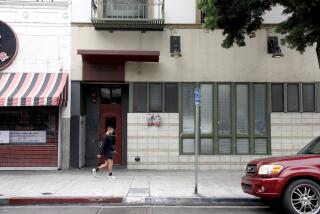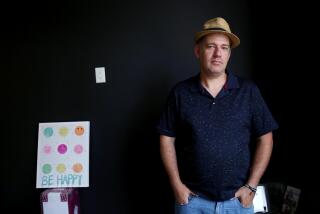L.A. Developer Clashes but Keeps On Building
- Share via
Alan Casden is not one to back down.
Over the years, the multimillionaire developer has sued a raft of business associates who have displeased him. One business partner -- who happens to be his brother -- says Casden openly mocked him. At a bar mitzvah party for oil tycoon Marvin Davis’ grandson, Casden shoved his wife as worried guests looked on, she has said in court papers.
Now, Casden is pushing again -- in this case, a controversial $100-million real estate project through the Los Angeles City Council.
Last week, the council took a preliminary step toward approval of Casden’s Palazzo Westwood, a Mediterranean-style apartment and retail complex, to be built on two long-vacant lots near UCLA. Final passage is expected this month.
It wasn’t long ago that things looked bleak for the 58-year-old Casden and his latest dream.
In November, Los Angeles County Dist. Atty. Steve Cooley filed felony charges against a vice president at Casden’s development firm, Casden Properties Inc., accusing him of trying to get around campaign finance limits by soliciting donations from friends and relatives of more than a dozen subcontractors and then illegally reimbursing them.
On the day of the indictment, Cooley said that Casden himself was a target of the inquiry, describing him as “a person used to manipulating the system.”
More than eight months later, no charges have been filed against Casden, who has denied any wrongdoing. But in January, in the wake of Cooley’s comments, City Councilman Jack Weiss vowed to get in the developer’s way.
(Over the last four years, Weiss has received contributions totaling at least $34,000 from Casden associates, according to campaign-finance reports. Weiss said he believed that those contributions were appropriate. The district attorney’s office has said that Weiss was not a target of its investigation.)
“I’m going to stop Casden,” Weiss told a group of angry Westwood property owners, saying that he was concerned about the district’s probe, among other things. The audience burst into applause.
Now, though, Weiss has changed his mind about the Palazzo Westwood.
A couple of weeks ago, a City Council planning committee that includes Weiss unanimously approved the project, sending it on to the full council, even though some neighborhood residents still object to certain design aspects of the complex.
Weiss said he came around after Casden began working with the community and compromised on several key issues, including agreeing to keep busy Glendon Avenue open during construction.
Those who know Casden say they aren’t surprised that he appears to have triumphed. “Alan is aggressive and focused, and he tends to get things done,” said Larry Kosmont, a Los Angeles real estate consultant.
Baseball Bid Strikes Out
Most Angelenos first heard of Casden last summer, when the lifelong baseball fan attempted to buy his beloved Los Angeles Dodgers from then-owner News Corp. He came to the party not only with a fat checkbook but with a grand vision to move the Dodgers into a new stadium downtown and to build thousands of houses and apartments at Chavez Ravine. At one point, he had the highest offer on the table: $400 million. But Casden’s prickly style and some lingering legal problems turned off those at News Corp., a company executive said. Eventually, the team was sold to another real estate mogul, Boston’s Frank McCourt.
The ill-fated bid for the Dodgers marked one of Casden’s few failures in a career spanning three decades.
In all, he has created 40,000 apartment units throughout Southern California, many of them for low-income tenants. He has scored on the high end, too, including in L.A. with the Broadcast Center and Hillcreste apartments, as well as the Palazzo at Park La Brea, a luxury apartment complex built on Third Street across from the Grove shopping mall.
Casden is a detail man, right down to picking the trim in individual apartment units. On a tour of the Palazzo at Park La Brea last year, he stopped in mid-sentence when he spotted a small impression of a boot heel frozen in the concrete of a hallway floor -- a blemish left behind by a careless worker. With a wag of his finger, Casden summoned an underling and instructed him to remove “that hoof print” right away.
Casden declined to be interviewed for this story. But in an interview last year, he described real estate development as “a very difficult, arduous business to be in, with great risk and not always good rewards.”
“It’s not selling movie tickets,” he said, suggesting that succeeding in his industry requires a particularly firm hand. “Ask anybody who has ever remodeled their house. There’s always problems. They open up walls, they find this, they find that. There is always something. I’m in a business where you have to control those variables.”
His ability to do just that has impressed at least one prominent colleague. Casden is “incredibly smart as a developer,” said Rick Caruso, who built the Grove and a string of other highly successful retail centers. Caruso, a member of the Los Angeles Police Commission, added that he didn’t know what, if anything, the district attorney might be examining when it comes to Casden, “but I think his character is getting beaten up for no good reason.”
After graduating from USC in 1968, Casden landed a job at Kenneth Leventhal & Co., a midsized accounting firm in Los Angeles that specialized in real estate.
Former Leventhal managing partner Stan Ross, now chairman of the Lusk Center for Real Estate at USC, remembers the young Casden as a fast learner. Casden had “all the characteristics of an entrepreneur,” Ross said. He was “a quick responder, very analytical.”
Above all, he prided himself on grasping the intricacies of a deal. “Picture yourself in a room with a guy who ... knows the details, and you’re not prepared and you’re talking in circles,” Ross said. “That’s not a good meeting if you’re on the other side” of the negotiations.
Building a Reputation
In the mid-1970s, Casden left Leventhal to strike out on his own as a developer. Since then, he has amassed a personal fortune estimated at $775 million by Forbes magazine.
But the building of his empire has come with a price: Even associates who say they get along with Casden often describe him in less-than-flattering terms -- brazen, condescending, boorish. In seeking to remain anonymous, several said they feared legal reprisal, citing Casden’s reputation as “the most litigious guy in the city,” in the words of one attorney.
A public records search by The Times found that Casden or his main development firm has been a plaintiff in almost 30 lawsuits against partners, contractors and law firms since 1985. Some of these have been countersuits. Casden’s name shows up as an officer (often president) or director of almost 100 existing or defunct companies across the country. Those companies have filed hundreds of lawsuits, many of which involved routine apartment-management issues.
In a statement to The Times, Casden said his reputation for being litigious was undeserved. “We rarely sue anyone,” Casden said, “but, like others in the real estate industry, we get sued.”
One suit that stung Casden was brought in the mid-1980s by real estate investors Patrick Higashi and James Kozen. They alleged that Casden and his related companies had acted deceptively, breached a contract and failed to compensate them for a 2-acre plot of land in Playa del Rey that they had transferred to him. In 1990, a Los Angeles County Superior Court judge ordered Casden and the companies to pay the pair’s $203,650 in legal bills and 40% of all profit generated by the property, where he had built an 80-unit apartment building. Higashi said the parties subsequently settled for an undisclosed amount.
Kozen, now semiretired, said he still recalled the words uttered to him by Daniel Salceda, a vice president of a Casden-controlled company who pulled him aside at a 1982 meeting -- a statement that appeared in a court ruling: “Hold onto your testicles and your wallet because Alan Casden will screw you.”
Salceda, who does not deny making the remark, said Casden’s business relationships tended to end badly. However, he also remembers Casden as an excellent developer with a Midas touch. “Everything I ever learned about real estate I learned from Alan,” Salceda said.
More recently, a Casden-controlled venture was hit with a class-action lawsuit on behalf of about 18,000 investors who contended that they were fooled into approving a transfer of ownership in 98 apartment-complex partnerships. In November 2002, a Los Angeles County Superior Court jury returned a $184-million civil judgment against Casden and three of his partners for violating certain Securities and Exchange Commission regulations and breaching their fiduciary duties.
A judge later reduced the damages to about $120 million. Casden, who had said he would appeal the decision, settled for $83 million last year. He then turned around and sued the lawyers who had represented him in the losing court battle, alleging malpractice. That case, court documents indicate, is close to settling.
Family Discord
Some of Casden’s most bitter clashes have hit closer to home.
In a 1999 lawsuit filed in Los Angeles County Superior Court, Casden’s brother, Henry, alleged that Alan and his companies failed to honor a promise to pay him bonuses and shares in a Casden real estate partnership. Alan countersued, contending that Henry had breached his contract and his fiduciary duty. Henry, who is about two years older than Alan, then filed a cross-cross-complaint.
Alan Casden won the original jury trial in May 2000, but two years later a state appellate court overturned that verdict. In October, a jury ruled in favor of Henry Casden, awarding him $5.5 million in severance (which with interest would come to $8 million).
At the same time, Henry was ordered to pay Alan $1 million for breach of fiduciary duties. Both sides have appealed.
“My brother has never been a particularly easy person to work with,” Henry Casden said in a May 1999 letter to the board of directors of Casden Properties in which he resigned as president after holding the title for just five months. The letter was filed as part of the lawsuit.
“My brother Alan’s behavior toward me has become progressively more and more offensive,” he told the board. “He has taken to making false and entirely unwarranted derisive remarks about me and my activities.”
Alan Casden’s attorney, Thomas J. Nolan, said his client had always been more than fair with his sibling. Nolan described Alan as “the younger brother who took pretty good care of his older brother,” helping him through law school, providing $1.3 million to remodel a Beverly Hills house and giving him a Rolls-Royce for his 40th birthday, which Nolan referred to as “an extreme gesture.” Yet, Nolan said, Henry always wanted more. Henry Casden did not return calls seeking comment.
Even messier have been Casden’s relations with his fourth wife, Nancy.
In divorce documents filed in 1993, Nancy Casden told how the couple shared a 28,000-square-foot mansion on 2 acres in Beverly Hills. It featured a pool with a waterslide, a sunken tennis court, a sauna, a two-story wine cellar with a tasting room, a projection screening room, a two-story library and more than 20 bathrooms.
The property also boasted two guest houses and a six-car garage. Circling the estate was a narrow-gauge train similar to the one in Griffith Park -- with steam and diesel engines -- that ran through a tunnel and under a waterfall.
For getaways, the Casdens traveled by private Gulfstream III jet to their second home in Snowmass, Colo.
But behind the scenes, tension was mounting.
Alan was “obsessed with control,” Nancy said in papers filed in Los Angeles County Superior Court, alleging that he once attempted to throw her across the room during “a violent tantrum” after she charged an item on his credit card without permission.
During a spat that is legendary in Beverly Hills, the pair fought at Marvin Davis’ estate after the bar mitzvah of Davis’ grandson, Brandon. Although separated at the time, the couple attended the party together with one of their sons. Nancy Casden said an evening of verbal sparring ended with Alan calling her a four-letter word in front of other guests.
As Nancy told it, she slapped him. He then pushed her, prompting Robert Bloomingdale to step between them. Bloomingdale, the son of Alfred Bloomingdale, the Diners Club founder and Ronald Reagan confidant, grabbed Alan by the collar and hauled him out of the party tent, she said.
In Alan’s version, Nancy smacked him after loudly demanding in front of mutual friends that he give her more money. He said in court papers that he never hit or threatened Nancy at any time during their marriage, but that she sometimes flew into rages and struck him.
Bloomingdale did not return several phone calls.
Barbara Casey, Casden’s spokeswoman, said that he had mellowed with age, and these days is concentrating on enjoying life with his wife, Susan, and their children. “In the past few years,” Casey said, “he’s made time in his life to work for his community, his religion and his university.”
Casden has contributed millions of dollars to the Simon Wiesenthal Center, a Jewish human-rights organization in Los Angeles. The USC trustee also has donated more than $10 million to fund a chair in his name at the university’s school of accounting, endow an annual real estate study in his name and create the USC Casden Institute for the Study of the Jewish Role in American Life.
It is on campus that Casden has sought to impart some of what he has learned in the trenches of the business world.
“Never compromise your principles,” he told USC accounting school graduates in a 2002 commencement speech, “even if it leads to difficulties in the short term.”
Times librarian John Jackson contributed to this report.
*
(BEGIN TEXT OF INFOBOX)
Alan Casden
Age: 58
* Position: Chairman and CEO, Casden Properties Inc.
* Hometown: Los Angeles
* Education: Bachelor’s degree in accounting, University of Southern California, 1968
* Forbes 400 ranking (2003): No. 328, with estimated net worth of $775 million
* Apartment units created in Southern California: 40,000
* Community and philanthropy: Co-chair of the board of trustees of the Simon Wiesenthal Center, member of USC’s board of trustees, endowed the Alan Casden Dean’s Chair at USC’s Leventhal School of Accounting, established the Casden Institute for the Study of the Jewish Role in American Life
Major Lawsuits and Controversies:
1990: In a dispute over 2 acres in Playa del Rey, Casden and several of his companies were ordered to pay investors $203,650 in legal bills and 40% of all profit generated by the apartments he built on the site. The parties later settled for an undisclosed amount.
June 2003: Casden Properties agreed to pay $83 million to settle a class-action suit alleging that investors were fooled into approving a transfer of ownership in 98 apartment-complex partnerships.
July 2003: Casden proposed buying the Los Angeles Dodgers, relocating their stadium and putting up housing on the old stadium site.
October 2003: A jury awarded $5.5 million to Casden’s brother Henry, who claimed Alan and his companies failed to honor a promise for bonuses and shares in a real estate partner- ship. Henry was ordered to pay Alan $1 million for breach of fiduciary duties. Both sides have appealed.
November 2003: A grand jury indicted a Casden Properties executive and 13 subcontractors for the company on charges of conspiring to hand out illegal campaign donations. Although Alan Casden was named as a target of the probe, eight months later he has not been charged.
Source: Times research
Los Angeles Times
More to Read
Inside the business of entertainment
The Wide Shot brings you news, analysis and insights on everything from streaming wars to production — and what it all means for the future.
You may occasionally receive promotional content from the Los Angeles Times.












